D.M.2020
Tales about manhood and memory
The Kuttāb
Fiction by: David Michaeli
From Hebrew: Efrat Yaari
The creek is parched and hard. The riverbed deepens
until it drops wildly unto the trunk of the main rivulets of the great basin.
That riverbed comes from the reclusive, violent ridge of Hebron, moderately
curving while extenuating its features and cascades like a melody heading for
its climax.
Several hundreds of yards before the great fall,
the riverbed curls like a horseshoe-shaped tail of a dragon.
I would often wonder, standing on the steep, razor-sharp saddle to the north about
the obscure spirit of the untamed entity coiling far below me. There, before
the curve, a pool of green water waited. A careful descent through erect stones
led there.
I used to reach this pool from the riverbed that
looked like a street delineated by high walls of rock. Two turns up the Oleander,
the dry stream opened sideways allowing for a strenuous climb to the moon-like
surface of the desert plateau. There, in the stream, on the ground washed by
distant flashfloods, with a handful of bent, forcefully flattened, bushes I
found the kuttāb.
The kuttāb is a rock. I walked in the dry
riverbed. The air vibrating with heat, the occasional humming of an insect
sounding in the background together with the cackling of the stones moved by
the weight of my steps. Every now and then an exceptional stone would attract
my gaze.
I was a highly skilled rock collector. The
desert itself taught me to move in an open trance allowing the right stone to suddenly beckon me,
reflecting in its shape, texture and colors my spirit, desires and time. I
would heed the minute call at my feet, stop and look at my soul's mirror hidden
among other rocks. At first, I was compelled to collect the desert's gifts. It
was dangerous and impervious to ignore the vast silent entity's gifts. I'd
kneel down with the rucksack on my back and collect the expressive rock. A black
flint taught me a strange poem. My home was filled with stones. On the windows
panes, under the beds, on shelves, in the washing room. In this sense I
followed my father, the tour guide, who to my mother's dismay, brought home stones
upon stones. The rocks were proper amulets. They treasured my varying attitudes
in place of the memory that grew more and more lucid and bright and light. My
confidence increased. Every once in while I would pass a calling stone,
experimentally pacing a few steps further and turning in vain to reclaim it. The
stone was gone. I realized that these stony revelations were not random. My
exposing gaze was true to one point in time. I stopped collecting the rocks
when I started offering them as amulets-gifts. I'd kneel down in the perched riverbeds
to pick up different stones, to look at them for a long while, occasionally
bringing my lips to it and then lying it back, meticulously, in its hole.
The kuttāb stopped me. It was the size of
a fist or a heart. Its surface graduated. It was covered in crisscrossing black
and white stripes and lines that created a texture and quasi patterns, almost
recognizable. When I looked at it, I felt I was on the verge of an understanding
but could not proceed. Into it. I asked its forgiveness, took it and placed it
in my bag. In my spirit's ears I could hear the desert snickering.
I rested by the green pool, surrounded by tall
lit walls of rock. I observed the stone for a long time. It said its name was kuttāb.
It means, it said, all that was written and shall be written. Then it spoke no
more. Its lines continued to wind leaving me with the ability to read all time
in it. I was overtaken by fear and put it back in the darkness of the backpack.
Next to me were the remains of a small ibex.
Letters of dark dry blood told the tale of the leopard over the dozens of
meters of cliffs where the wild goat tried to flee for its life.
The heat of the strong sun pushed me to move on. I still
had a long way ahead. I dipped in the pool and climbed up with soaked clothes
along the inscribed blood stains to the desert's plateau. At the top, my
backpack grew heavier. My lungs hurting from breathing. Eventually I stopped,
laid down the backpack and took out the kuttāb. I looked around. Random
stones were dispersed everywhere. I carefully placed it by my floor, observed
it again, in the veiled code. I stood up, turned my face and lifted the
backpack. It was significantly lighter. I stepped away while tightening the
waist strap. Three paces later I turned around. The rock was indiscernible.
Days later, in the metropolitan, I made love to
a woman. Warm bleary stripes of shade rested upon her lit skin. Suddenly they
deciphered. The curvaceous stains of time regained motion. I shut my eyes in
anger but to no avail. Time continued to write itself unremittingly in red
under my lids.
From now on, wherever I turned, time unraveled
before me. The future deciphering in the moving foliage and its shadows, in the
bark of a tree, in the light stains on the pavement, in the sparkling trails of
a slug in the morning. Eventually, I become accustomed to the incessant knowing
like to an unnoticed background noise. To people's dismay, I burst out laughing
in unexpected places. Yet, most of the time, I am silent, oblivious, enchanted
only by the directions, moving, crossing and separating of the pond of reality.






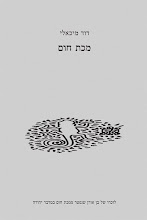
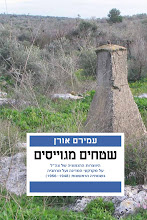
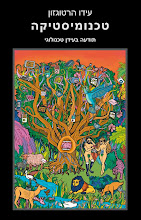
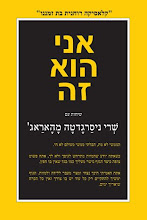
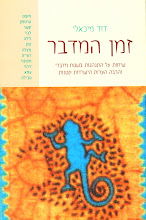
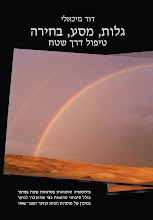

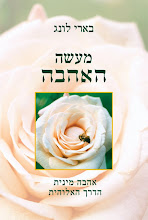
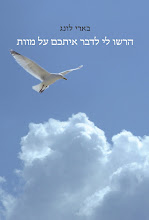


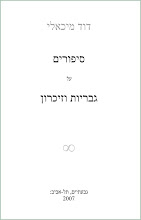
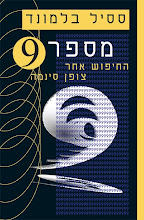
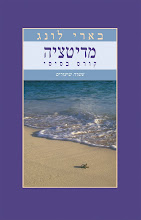
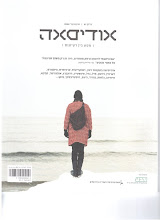

אין תגובות:
הוסף רשומת תגובה